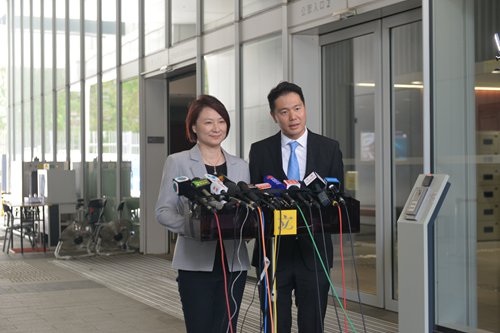HOME >> CHINA
HK lawmakers slams US over bill
By Lu Wenao in Hong Kong and Zhang Han in Beijing Source:Global Times Published: 2019/9/17 21:13:40

Starry Lee Wai-king, chairperson of the Democratic Alliance for the Betterment and Progress of Hong Kong, and Holden Chow Ho-ding, vice chairperson of the DAB at a Tuesday press conference. Photo: Zhao Juecheng/GT
Hong Kong lawmakers and media on Tuesday slammed the US for colluding with Hong Kong secessionists to pass the so-called Hong Kong Human Rights and Democracy Act, saying it is absurd and interferes in the city's internal affairs.
Starry Lee Wai-king, chairperson of the Democratic Alliance for the Betterment and Progress of Hong Kong (DAB), on Tuesday told media that the US use of domestic legislation to affect foreign jurisdictions is inappropriate.
The act intends to put pressure on the Hong Kong Special Administrative Region (HKSAR) government, and even the central government. The US is using its "law" to interfere in internal affairs of the HKSAR.
Holden Chow Ho-ding, vice chairperson of the DAB, said the act is unnecessary and inappropriate. If the bill gets approved, tensions between China and the US may escalate, which will fray bilateral relations.
Lee and Chow made the remarks after a meeting with Hanscom Smith, US consul general to Hong Kong and Macao, on Tuesday, urging him to convey the message to the US Congress.
The act would require the US federal government to annually assess Hong Kong's political autonomy to decide whether to give it preferential economic and trade benefits under US law.
There is a deep economic trade relationship between the HKSAR and US, with over 300 American companies in Hong Kong. If there is a change in the status of Hong Kong, that would also have consequences and also harm US interests, said Chow, who urged the US to have second thought about the bill.
Charles Ho Tsu-kwok, the Chairperson of Sing Tao News Corp, published an open letter on Sing Tao Daily, asking consulates of other countries in Hong Kong not to "go with the evil."
Secessionists have been lobbying the US Congress to pass the bill, which is "ridiculous" and "meddling right with wrong."
Hong Kong ranked the top three on a 2018 report by Canada-based think tank Fraser Institute on freedom of economy. The secessionists who live in a highly free society are rushing to the US with less freedom. Are they really fighting for freedom and democracy on behalf of Hong Kong people, or "out of some ugly political plot?" Ho asked.
Ho lived in the US for more than three decades and returned to Hong Kong before the city was returned to China in 1997. He admitted he used to worry whether the "one country, two systems" principle could be well implemented.
Unbiased people would agree that Hong Kong today has taken the lead in human rights and freedom, far ahead of many Western countries. Political participation, speech and press freedom are better under the principle than the colonial period, Ho said, noting US interference is groundless.
After the extradition bill was withdrawn, street violence continued and some political figures kept inviting foreign interference. They have exposed their purpose - use the unrest to push forward the secessionists' end.
Protesters have been enjoying freedom of assembly and protests since June, but more and more violence has happened, including throwing Molotov cocktails, vandalizing public transportation facilities, attacking police officers and people who hold different political views.
"Under any standard, the demonstrations were not peaceful and were intolerable," Ho stressed.
Indoctrinating youngsters who are immature with extreme political ideals and inciting them to go to the frontline of violence reminds people of terrorists such as ISIS, he said in the letter.
Ho called on consulates to understand that supporting violent protests is supporting secessionism.
Hong Kong Chief Executive Carrie Lam also chastised the US Congress for introducing a bill in support of the city's radical protesters, saying that it is "extremely inappropriate."
Hong Kong legislative council members, including Ho Kai-ming, Steven Ho Chun-yin and Regina Ip Lau Suk-yee, have also expressed their opposition to the act.
US interference has turned from a clandestine deal to something brazen, Ho Kai-ming said.
Hong Kong secessionist Joshua Wong Chi-fung and Denise Ho, another Hong Kong-secessionist of Canadian nationality, are scheduled to testify before a US House commission on Tuesday, media reported.
Posted in: HK/MACAO/TAIWAN